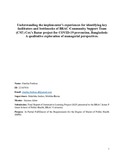| dc.contributor.advisor | Sarker, Malabika | |
| dc.contributor.advisor | Barua, Mrittika | |
| dc.contributor.author | Ferdous, Sharika | |
| dc.date.accessioned | 2023-07-23T09:35:21Z | |
| dc.date.available | 2023-07-23T09:35:21Z | |
| dc.date.copyright | 2023 | |
| dc.date.issued | 2023 | |
| dc.identifier.other | ID 22167016 | |
| dc.identifier.uri | http://hdl.handle.net/10361/18971 | |
| dc.description | This project report is submitted in partial fulfillment of the requirements for the degree of Master of Public Health (MPH), 2023. | en_US |
| dc.description | Cataloged from the PDF version of the project report. | |
| dc.description | Includes bibliographical references (pages 20-22). | |
| dc.description.abstract | Introduction: Recent research has highlighted the significance of understanding a managers'
perspective for improving implementation to successfully execute interventions. It is still largely
unexplored how their experiences with the implementation process in health care sectors affects
the implementation outcome. Hence, this study aimed to understand the experiences of BRAC’s
managerial level program implementors of the Community Support Team (CST) Cox’s Bazar
project to identify the barriers and facilitators of their work on program implementation.
Method: An exploratory study design was used, applying qualitative approach with BRAC
managers who coordinate activities in Cox’s Bazar Sadar, Ramu and Kutubdia unions located in
Cox’s Bazar district. A total of 8 BRAC CST project managers were selected through purposive
sampling among whom 5 were Community Mobilizers and 3 were Volunteer Coordinators
located across the 3 unions. A semi-structured guideline was developed and data was collected
through 8 in-depth interviews (IDIs). Both deductive and inductive approach was followed
during analysis. Ethical approval was obtained from BRAC James P Grant School of Public
Health's Institutional Review Board (IRB) to conduct the research.
Findings: The study found several key facilitators and challenges faced by managers during the
implementation of the project. The main facilitators of the managerial work found from the study
were, strong team bonding, social recognition of organization, rapport with higher officials,
support from supervisors and community people, familiarity with local context, being a local
resident, and knowledge through past experiences. Among the challenges identified from the
managers interviewed in this study, the main issues revolved around unavailability of higher
officials, social unacceptability, unable to meet community expectations, lack of flexibility,
unfamiliar language and weather constraints.
Conclusion: The findings emphasize a need for building strong teams and social networks which
should be the managerial attention focus in order to increase performance effectiveness and
intervention success. | en_US |
| dc.description.statementofresponsibility | Sharika Ferdous | |
| dc.format.extent | 22 pages | |
| dc.language.iso | en | en_US |
| dc.publisher | Brac University | en_US |
| dc.rights | Brac University project reports are protected by copyright. They may be viewed from this source for any purpose, but reproduction or distribution in any format is prohibited without written permission. | |
| dc.subject | Community Support Team (CST) | en_US |
| dc.subject | BRAC | en_US |
| dc.subject | Key facilitators | en_US |
| dc.subject | Bottlenecks | en_US |
| dc.subject | Cox’s Bazar | en_US |
| dc.subject | Covid-19 | en_US |
| dc.subject.lcsh | Covid -19 (Disease) | |
| dc.subject.lcsh | Covid-19-- Prevention | |
| dc.title | Understanding the implementer’s experiences for identifying key facilitators and bottlenecks of BRAC Community Support Team (CST) Cox’s Bazar project for COVID-19 prevention, Bangladesh: a qualitative exploration of managerial perspectives | en_US |
| dc.type | Project report | en_US |
| dc.contributor.department | James P Grant School of Public Health, Brac University | |
| dc.description.degree | M. Public Health | |

